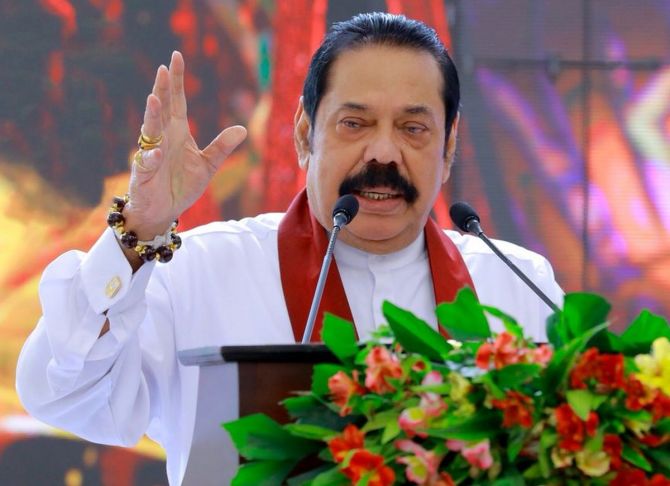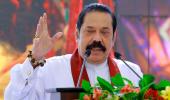Sri Lanka's former prime minister Mahinda Rajapaksa is being protected at the Trincomalee naval base after he was evacuated from his official residence, Defence Secretary Gen (retd.) Kamal Guneratne said on Wednesday, as security forces in armoured vehicles patrolled across the country with orders to shoot at sight amid continuing protests at the government's handling of the worst economic crisis.

The 76-year-old Sri Lanka People's Party (SLPP) leader, known for his brutal military campaign against the Liberation Tigers of Tamil Eelam during his presidency from 2005 to 2015, resigned on Monday after violence erupted following an attack on the anti-government protesters by his supporters.
The attack triggered widespread violence against pro-Rajapaksa politicians, leaving nine people, including two police officers, dead.
Mahinda, who served as the country's prime minister thrice, saw his residence set on fire on Monday. He, along with his wife and family, fled his official residence - Temple Trees - and took shelter at the naval base in Trincomalee after a series of deadly attacks on his supporters.
"He (Mahinda Rajapaksa) was evacuated to the Trincomalee naval dockyard,” Guneratne told reporters during an online briefing.
Trincomalee is a port city on the northeast coast of Sri Lanka.
Gunaratne said after it was determined that it was not suitable for Mahinda to remain at Temple Trees, the necessary decision was made to relocate him.
As word spread about Mahinda's presence at the Trincomalee Naval Base, people started a protest near the key military facility.
"He will not live there forever. After the situation returns to normal, he will be relocated to a residence or location of his choice,” Gunaratne said.
The defence secretary said it is important to protect every single life in the country, and after it was determined that it was not suitable for Mahinda to remain at Temple Trees, the necessary decision was made.
"He is a former President and is entitled to adequate security,” he added.
Mahinda is also facing calls for his arrest from Opposition politicians for inciting violence against peaceful anti-government protesters who were seeking his resignation as well as that of his elder brother and President Gotabaya Rajapaksa for mismanaging the country's economy.
Meanwhile, army troops on military vehicles marched on the streets of Colombo to ensure public security, a day after the defence ministry ordered the Army, the Air Force and the Navy personnel to open fire on anyone looting public property or causing harm to others.
Army Special Forces' Combat Riders have also been deployed on mobile patrol in Colombo and suburbs, the News First news portal reported.
Defence Secretary Gunaratne also said that "there will never be a military rule in Sri Lanka, I say this with responsibility." His comments came amid concerns over the increasing role of the military in the ongoing political and economic crisis.
President Gotabaya on Wednesday urged the public to reject subversive attempts and said it is the time for all Sri Lankans to join hands as one, to overcome the economic, social and political challenges.
"This is the time for all Sri Lankans to join hands as one, to overcome the economic, social & political challenges. I urge all #Srilankans to reject the subversive attempts to push you towards racial & religious disharmony. Promoting moderation, toleration & coexistence is vital,” the President said on Twitter.
He had earlier urged the people to stop "violence and acts of revenge" against fellow citizens and vowed to address the political and economic crisis facing the nation.
President Gotabaya will hold talks with the ruling party dissidents and the main Opposition SJB on Wednesday to end the political impasse and appoint a successor to ousted prime minister Mahinda.
"We will have more talks today. Hopefully we will see an end (of the political impasse) today,” Anura Yapa, a senior leader of the independent group that had split from the ruling SLPP coalition, told PTI.
The main Opposition Samagi Jana Balawegaya, the ruling party dissidents and President Gotabaya Rajapaksa have been holding talks for the last two days without much success, according to sources.
A curfew is in force across the island nation after mobs burned down the ancestral home belonging to the ruling Rajapaksa family amid mounting anger for their mishandling of the economy, leading to the island nation's worst economic crisis.
Over 250 people were injured in the clashes which also saw scores of properties belonging to ruling party politicians being set on fire.
United Nations human rights chief Michelle Bachelet said she was "deeply troubled" by the escalation of violence in Sri Lanka and called for a thorough and transparent probe into the attacks on peaceful anti-government protestors and members of the ruling party.
Bachelet urged restraint and meaningful dialogue to address the grievances of the population amid the severe economic crisis in the country. She said the UN Human Rights Office will continue to closely watch and report on the situation in the country.
The Human Rights Watch also condemned the "partisan response" to peaceful anti-government protests in Sri Lanka, demanding that the security forces fully respect the right to peaceful assembly and those responsible for violence be held to account.
On Wednesday, the Sri Lankan police summoned the chief security officer of the former prime minister and recorded his statement over the attack on peaceful protesters at Galle Face and near Temple Trees - the prime minister's residence.
A criminal investigation has been launched into the mob attack on peaceful protesters at Galle Face and near Temple Trees.
The Attorney General had advised the Inspector General of Police to expedite the investigations into the incidents.
Meanwhile, the International Monetary Fund said on Wednesday that it would continue the technical level talks with debt-ridden Sri Lanka to prepare for policy discussions once a new government has been formed in the island nation.
The IMF said that it remains committed to assisting Sri Lanka in line with its policies, the Colombo Gazette news portal reported.
"On our virtual mission during May 9-23, discussions at the technical level have just started and continued as planned so as to be fully prepared for policy discussions once a new government has been formed,” the IMF said in a statement.
The IMF also said that it is following developments in Sri Lanka closely and is concerned about rising social tensions and violence.
In the last meeting, the IMF assured to help the country with an amount of USD 300 million to USD 600 million.
Sri Lanka is facing its worst economic crisis since gaining independence from Britain in 1948. The crisis is caused in part by a lack of foreign currency, which has meant that the country cannot afford to pay for imports of staple foods and fuel, leading to acute shortages and very high prices.
Thousands of demonstrators have hit the streets across Sri Lanka since April 9 seeking the resignation of President Gotabaya and his brother Mahinda, as the government ran out of money for vital imports; prices of essential commodities have skyrocketed and there are acute shortages in fuel, medicines and electricity supply.











 © 2025
© 2025